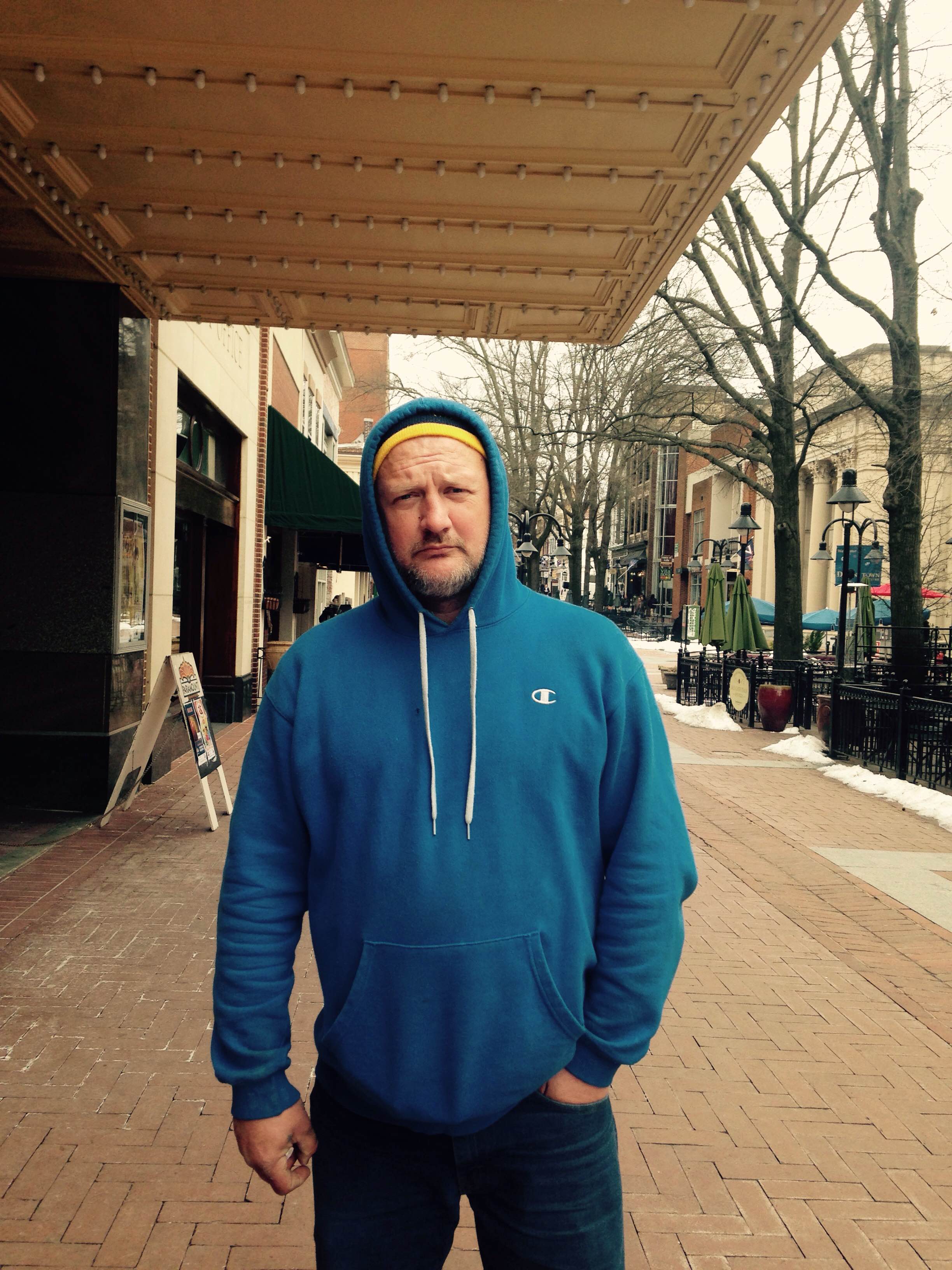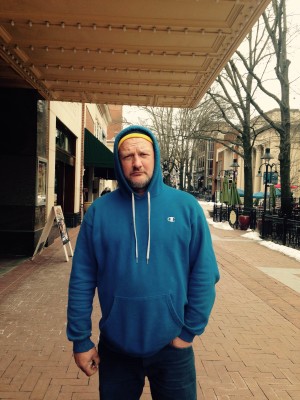
Charlottesville’s Homeless Tell their Stories
Robert Heiston sat along the Downtown Mall enveloped in an old paperback book. His hands were worn and cracking, reddened and slightly purple from the February cold. Heiston has been living on the streets of Charlottesville since Dec. 2013. He was born over an hour north of the city in Luray, Virginia, on June 1, 1970. From a young age, Heiston struggled with depression and maintaining focus. At the age of 17, he was diagnosed with clinical depression, ADD, and later PTSD, and continues to receive medication for these conditions today. After obtaining his GED from Page County High School, Heiston moved north to Pennsylvania, where he attended Red Rock Job Corps Center.
Red Rock is a no-cost, government-funded institution that educates young people, ranging from 16 years old to 24, in hopes that expertise in a particular job field can improve their quality of life. At the age of 18, Heiston began studying diesel mechanics there and finished his program on time two years later. With a vocational degree in hand, Heiston moved back down to Virginia to start his life.
After living with his girlfriend for several years and struggling to find work, Heiston turned towards other avenues to make ends meet. He, his brother, and his girlfriend began cashing bad checks at various stores around the area. While profitable in the moment, cashing checks is a risky business. It was not long before the banks became aware of Heiston’s operation and police began visiting his girlfriend’s home, where he was living. Heiston’s name was the one printed on the checks. While his brother and girlfriend had been equally involved, he was the one the police were looking for. He warned his young girlfriend not to open the door or answer any questions unless the officers had a warrant. As the pressure increased and reality started itching its way to the surface, she became more and more fearful. Eventually, both Heiston’s brother and his girlfriend contacted the police and told them the entire operation was his doing.
In return for their cooperation, both his brother and girlfriend received six months’ probation. Heiston received a 43-year sentence for the outstanding amount of money the group had stolen. In the end, he served 17 years and paid $17,000 in restitution. While it was a severe price to pay, Heiston does not altogether regret what happened. He said, “Her and my brother told them everything. Which in a way I am kind of glad they did, because I was tired of [living that way].”
After 17 years in prison, Heiston was released and quickly moved in with a girl he had met. With a criminal record and struggling under mental health issues, finding a job was incredibly difficult. Eventually, he was able to secure a job with a tree company in Luray. Heiston worked as a tree climber, scaling the corpulent trunks high above the ground and cutting down limbs, for some time. However, the work was dangerous and on January 11, 2007, Heiston fell from a tree and broke his back. The injury was painful enough in itself; however, the true pain came from the cure.
Heiston was prescribed a number of painkillers to relieve the overwhelming agony in his back. With ample supply and easy access, he was quickly addicted to the relief. Looking back on his use Heiston is not embarrassed. He said, “I’m not ashamed of that at all, because it made me the person I am.” As always, he is relentlessly positive, trying to find the serenity in an otherwise chaotic life.
In 2009, Heiston was fed up with Virginia and ready for a change. He bought a bus ticket and traveled nearly 1,000 miles to New Orleans. A cousin who worked for FEMA, helped him get a job setting up relief trailers for families and individuals who still had no home to go back to in the devastating aftermath of Hurricane Katrina. After three years of working in the “Queen City of the South,” FEMA’s funding for the operation ended, and he was forced to move back up north.
For the next few months, Heiston stayed with his parents in Luray, until he met a young woman whom he moved in with. They lived together until the end of 2013. With his dependence on painkillers continuing to take hold of his life and cripple him further, Heiston moved to Charlottesville for one basic reason: to get clean. He had heard of a Methadone clinic in the city called ARS Pantops Clinic. Heiston was approved for treatment and assigned a counselor at the facility to assess his needs and work with him through treatment. With the help of the doctors, counselors and treatment he was able to finally beat the overwhelming burden of addiction. On March 7, 2014, he was completely sober and has remained that way ever since. It has been two years since he felt the comfort of a bed or the security of a roof over his head.
While Charlottesville offers a number of solutions to the homeless epidemic, they have not solved his. The primary housing resource is Rapid Re-Housing, a program which seeks to quickly meet the needs of those living on the streets by putting them in temporary homes. Since April 2015, the program has placed 50 individuals into permanent housing. The screening process assesses applicants based on their medical vulnerability, and they are then assigned a risk level according to the severity of their condition. The more vulnerable an individual is, the more opportunities. Unfortunately for Heiston, he does not meet the program’s requirements. His condition is not severe enough, and the program prioritizes based on the level of need. In the end, Heiston’s only crime is good health.
Heiston expressed his frustrations with the system when he said, “People that have been in this program two or three times, they will get kicked out, and a week later they will put them back in another place. March 7 of this year will be two years. They have not one time come to me about an apartment.” He later said, “I knew one guy who tore out the walls, putting holes in the walls and they kicked him out and they put him back in a place two weeks later. I mean, what sense does that make?”
Heiston has used outside relationships he has made since living in the city to help his chances at obtaining a slot in the oceanic calendar of the Rapid Re-Housing program. A local business owner, a former school principal in the area, and his counselor at the methadone clinic have all contacted the program and vouched for his strength of character. It is an incredibly frustrating situation for two main reasons. Heiston is actively trying to get into the program, and his acceptance is completely out of his control. And secondly, every time he makes a step forward, he gets knocked two steps back. Heiston pays $13.50 a day for his methadone because he does not qualify for insurance. It is an expense that he must pay in order to maintain sobriety and continues to strip money away from the paltry reserve of finances he already has. Someday, he wishes to be completely off the methadone, but with the overwhelming obstacles he is already facing, it is best to take on one challenge at a time.
Recently, Heiston lost his only remnant of a home, a small tent. The city received a complaint because of the location of his tent, which had all of his belongings in it, and threw the canvas home into the trash with no warning, according to Heiston. This was two weeks ago, and since then life has been very hard for him. The nights are too cold to sleep without his tent and sleeping bag, so he occupies his time and stays warm by wandering around the city, until he sees those soft, welcoming rays of sunshine breaking over the horizon. Unfortunately, there is no way to get his belongings back. They are gone forever, and while it may not have been a large amount to some, it was everything for him.
It is a perpetual cycle of poverty. Responsibility lies on both ends of the spectrum; it does not solely fall on the city and the community to make sure the homeless are warm and fed. However, there is a disconnect between city programs and many who do not fit into specific slots that have been created to assess the most dire cases. Heiston does not beg for money. He will not ask a passerby for a dollar, or some change. He has a sign up that informs anyone passing by that he needs help and if they could spare any change it would be greatly appreciated. He is also very articulate, and at this point in his life, physically sound.
Does that mean that he does not deserve the help that so many others are being given? In many ways, Heiston is the perfect candidate. He is not chronically crippled, physically or mentally, and while he struggles in those departments, he is able to overcome them and press on. A small opportunity, simply a roof over his head, may be the springboard he needs to climb out of this hole. Heiston reflected on his time in Charlottesville, saying, “I’ve lost a lot in two years, man. I’ve lost friends; I’ve lost a home I had; I’m just tired of this life man; it’s never ending.”





